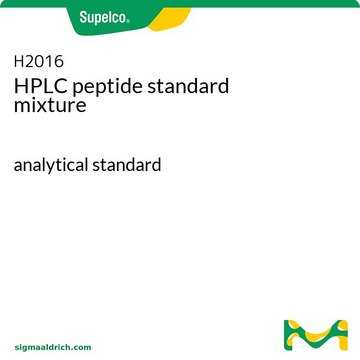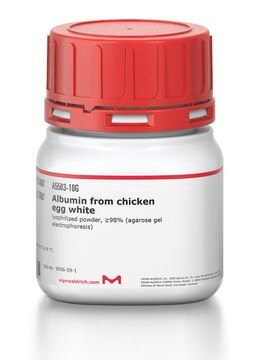N5266
Neurotensin Fragment 8-13 acetate salt
≥97% (HPLC), suitable for ligand binding assays
Synonym(s):
L-arginyl-L-arginyl-L-prolyl-L-tyrosyl-L-isoleucyl-L-leucine
About This Item
Recommended Products
Product Name
Neurotensin Fragment 8-13 acetate salt, ≥97% (HPLC)
Quality Level
Assay
≥97% (HPLC)
form
powder
technique(s)
ligand binding assay: suitable
color
white
application(s)
cell analysis
storage temp.
−20°C
SMILES string
CCC(C)C(NC(=O)C(Cc1ccc(O)cc1)NC(=O)C2CCCN2C(=O)C(CCCNC(N)=N)NC(=O)C(N)CCCNC(N)=N)C(=O)NC(CC(C)C)C(O)=O
InChI
1S/C38H64N12O8/c1-5-22(4)30(34(55)48-28(36(57)58)19-21(2)3)49-32(53)27(20-23-12-14-24(51)15-13-23)47-33(54)29-11-8-18-50(29)35(56)26(10-7-17-45-38(42)43)46-31(52)25(39)9-6-16-44-37(40)41/h12-15,21-22,25-30,51H,5-11,16-20,39H2,1-4H3,(H,46,52)(H,47,54)(H,48,55)(H,49,53)(H,57,58)(H4,40,41,44)(H4,42,43,45)
InChI key
DQDBCHHEIKQPJD-UHFFFAOYSA-N
Looking for similar products? Visit Product Comparison Guide
Amino Acid Sequence
Biochem/physiol Actions
Linkage
Storage Class Code
11 - Combustible Solids
WGK
WGK 3
Flash Point(F)
Not applicable
Flash Point(C)
Not applicable
Personal Protective Equipment
Choose from one of the most recent versions:
Already Own This Product?
Find documentation for the products that you have recently purchased in the Document Library.
Our team of scientists has experience in all areas of research including Life Science, Material Science, Chemical Synthesis, Chromatography, Analytical and many others.
Contact Technical Service







